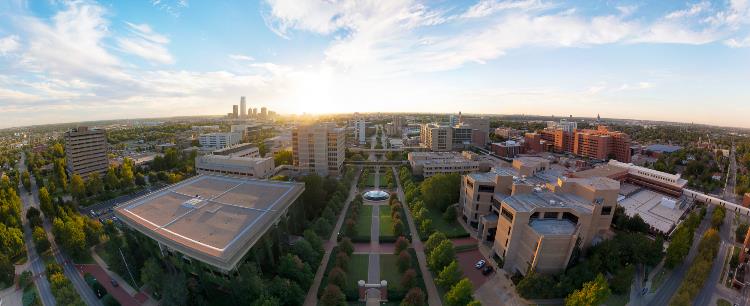The University of Oklahoma Health Sciences Center Department of Neurosurgery Residency Program is dedicated to providing its residents with premier training in a wide breadth of neurosurgical procedures, patient care, and research to prepare them become leaders in the field. Our faculty feel great pride and responsibility in training the future leaders of neurosurgery. Read more about our residency program on Doximity.

Since its establishment in 1946, the program has flourished into a comprehensive, state-of-the-art seven-year program with an intensive curriculum encompassing every major sub-specialty ensuring that our residents receive premiere training. The department has cultivated a commitment to resident education through a collegial and collaborative environment between residents and faculty which leads to outstanding resident education and care for our patients. Through a paradigm of graduated responsibility and autonomy, residents learn the fundamentals of surgery, care of critically ill patients, and principles of neurosurgical decision-making which equips them to handle all types of cases, from simple to the complex, by their senior years of residency.
We are proud to be part of a comprehensive health sciences center that encompasses over 300 acres with seven professional colleges and innovative research spanning all disciplines. Such a breadth of research opportunities allows for pioneering collaborative opportunities, and our residents are encouraged to take advantage of these. The undergraduate campus is only 20 miles away in Norman, OK and this offers and even greater opportunity for collaboration and innovation. As such, our faculty and residents are involved in a variety of research projects ranging from basic science to translation to clinical research.
Our residents receive ample surgical experience while rotating through the Oklahoma University Medical Center, The Children’s Hospital, the Oklahoma City Veterans Affairs Medical Center, and Mercy OKC. These cases cover brain tumors, skull base surgery, cerebrovascular disorders, neurotrauma and neurocritical care, pediatric neurological disorders, movement disorders, peripheral nerve and pain disorders, spinal disorders, and radiosurgery. The rotation at Mercy has become a favorite among the residents and gives them the opportunity to experience general neurosurgery in a private setting.
Resident selection is an important part of the process and to continuing our mission. Due to our high clinical volume, research productivity, and breadth of didactics, we currently accept 2 residents per year. We are interested in recruiting talented residents who demonstrate ample intellectual capacity, high moral standards, humanistic attitudes, and scientific interests who are passionate about neurosurgery and prepared to make a serious commitment to a demanding and rewarding educational experience. We make an effort to seek candidates that have strong academic and scholarly interests that aspire to be the future of our field.
Facilities Overview
The Oklahoma University Health Sciences Center is a 200-acre campus located one mile south of the state capitol in Oklahoma City. The Center includes The Children's Hospital at OU Medicine, Harold Hamm Diabetes Center, Stephenson Cancer Center, Colleges of Medicine, Dentistry, Allied Health, Public Health, Nursing, Pharmacy, the Graduate College, the Robert M. Bird Library, Oklahoma Medical Research Foundation, Dean McGee Eye Institute, the state Department of Health, Oklahoma Blood Institute, Medical Examiner’s Office and the Veterans Affairs Hospital.
OU Medical Center is a 355-bed facility with 22 ORs and 78 ICU beds. It's also the site of the largest healthcare infrastructure build in the state, and one of the largest in the country. A new bed tower was completed in 2020 with 450,000-square feet of additional space, eight floors and room to grow, 144 added beds, 32 new operating rooms and more.